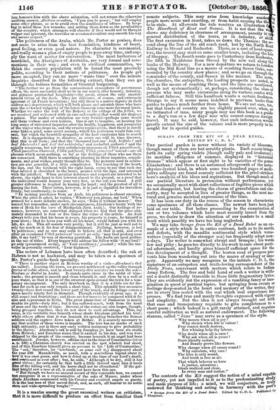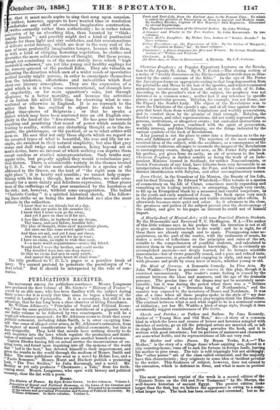SCRAPS FROM THE SIT OF A DEAD REBEL.
EDITED BY C. D. L.* THE poetical garden is never without its variety of blossoms, though many of them are but scrubby plants. Each season brings forth its early spring violets (though sadly pale and inodorons); its meridan effulgence of summer, displayed in "historical dramas" which appear at first sight to be varieties of the genes Elizabethan ; and there is an autumnal aftergrowth of the meta- physico-lyrical kind, in which some two hundred pages of medi- tative soliloquy are found scarcely sufficient for the grief-stricken hero's analysis of his ideas and aspirations. But though much of our poetical literature is pretension without performance, 'et we occasionally meet with short collections of fugitive pieces which do not disappoint, but having the charm of gracefulness and sin- cerity, may be accepted in lieu of greater thins, as the most na- tural and genuine metrical expressions of the time.
It has been our duty in the course of the season to characterize some specimens of all these classes. The newest have been just laid on our table. But before proceeding to the examination of one or two volumes which have most recently issued from the press, we desire to draw the attention of our readers to a small work which possibly we have too long neglected.
We may take Scraps from the Sit of a Dead Rebel as an ex- ample of a style which is in entire contrast, both as to its merits and defects, with the maudlin sentimental style which verse- writers (especially of the stronger sex) too frequently adopt now- a-days. The writer is somewhat abrupt and brusque ; his words few and pithy; he goes too directly to his work to care about poeti- cal adornment, and hardly gives himself sufficient space for the due development of a thought. The beaten road of purpose re- vents him from wandering out into the mazes of analogy or ima- gery. Apparently we may recognize in the initials C. D. L. the signature of an outspoken and truth-loving correspondent of the Daily News, conversant with matters which relate to Indian Army Reform. The free and bold hand of such a writer is with- out a doubt distinctly traceable in these little fragmentary lyrics. They are evidently not the expression of a rambling fancy or ima- gination in quest of poetical topics, but springing from events or feelings deep-seated in the heart and memory of the writer, they are in every line sealed with the seal which real experience. im- presses. We find true and manly thoughts expressed with vigo.ur and simplicity. But the idea is not always brought out with that ease and transparency requisite to give completeness ta a short poem ; which indeed is a gift rarely attained, and requires careful cultivation as well as natural endowment. The following stanzas, called " June " may serve as a specimen of the style.
"Why mourn when all is joy ? 'Why shrink when life is valour ? Fear cannot death destroy, Nor whining help thy labour.
'Why doubt when all is sure? Why ask when all is yours ? Stars silently endure, And Beauty grows like flowers.
Why change when all comes round ? Why calculate, why care ? The false is only sound, And truth is free as air.
That which behoves us here Is justice, adoration ; Ideals realized and clear,
In every man and nation."
The contents of the Sit suggest the notion of amid capable of poetry, yet not impelled to it as to the predominating stuaY and main purpose of life ; a mind, we will conjecture, so trulj
endowed for thinking and acting in harmony with the poet's
• Scraps from the Kit of a Dead Rebel. Edited by C. D. L. Published by Chapman.
to
g, that it must needs aspire to sing that song upon occasion. author, however, appears to have wanted time or resolution
dertake any effort of sustained imaginative construction. writes earnestly rather than testhetically ; he is rather taken mossession of by an absorbing idea, than haunted by " thick- r-eenii.ag fancies'; and possibly might feel a kind of puritanical distaste for those light and airy subtleties, and fair concatenations of delicate aerial fantasy, which are dear to the very soul of the man of more profoundly imaginative temper, because with them, with a kind of clinging flowering vegetation, he clothes and diversifies the more solid structures of thought. Int these poems, though not reminding us of the more stately trees which "high overarch'd embower," are yet like young and healthy saplings for the nursery-ground of the poetical. Eden. They are valuable as indicating the direction which men of a wider reach of speculative poetical faculty might pursue, in order to emancipate themselves ?tom the trickeries, affectations and imbecilities which float about our literary atmosphere. They are the expression of a mind which is in a true sense unconventional, not through love of singularity, or for mere opposition's sake, but through allegiance to a better morality, and because the activities of an Indian life afford little time for observing what is con- ventional or otherwise in England. It is no reproach to the writer that he has omitted to adjust his watch to the gilded time-pieces of Belgravia ; or that he speaks a aialect which may have been nurtured into an old English sim- plicity.in the land of the "five rivers." He has gone far towards acquiring and practising that secret of power which consists in trusting to reality, without any disturbing thought as to the ro- mantic, the picturesque, or the poetical, or as to what critics will deem so. He sees that not only those objects which we regard as the accepted types of what is beautiful, the rose and lily for ex- ample, are sweetest in their natural simplicity, but also that grey stones and dull twigs and rudest mosses, being beyond art or man's device, have an interest of which nothing can deprive them except careless or studied misrepresentation. Such truths may appear trite, but properly applied they would revolutionize poe- tical diction. There is considerable variety in the themes treated by C. D. L. One of the most characteristic is a species of ode addressed to the Queen, on the text of "the right man in the right place "; it is hearty and sensible ; we cannot help sympa- thizing with its idea ; though, here as elsewhere, we wish occa- sionally for a more dainty and felicitous expression. Other pieces treat of the sufferings of the poor occasioned by the harshness of the rich; not, however, without some exaggeration. The ballad "Charlotte Corday" is a spirited historical sketch. The follow- ing lines strike us as being the most finished and also the most pathetic in the collection. "I know that we are friends but of a day,
And that our paths in life asunder lie ; I know that I must soon go far away, And yet I gaze on thee as if for aye.
A face like thine in boyhood was my dream, Thy tones, unheard before, familiar fall ; Thy play of thought, thine eyes' mysterious gleam, Are unto me like seine sweet spirit's call.
And thou art sad, and yet I may not cheer, And thou art ill, yet not for me to tend ; I have no claim, no right to wish thee near, I—a mere world acquaintance—scarce thy friend.
Would God I were thy brother, and could soothe Thy troubled days into one deep repose ; Or that we twain had met in early youth, And spared thy gentle heart its cruel woes."
The title prefixed to C. D. L.'s pages is a peculiar freak of fancy. We cannot pretend to penetrate the pseudonym of "a dead rebel." But it should be interpreted by the rule of con- traries.



























 Previous page
Previous page